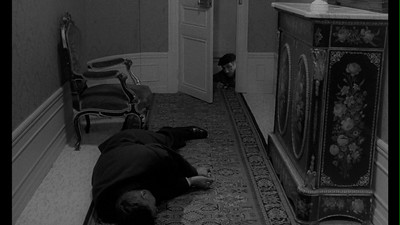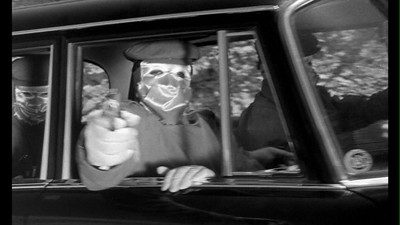
The title of Jean-Pierre Melville's 1966 crime picture Le deuxiéme souffle translates as "second wind," and that seems as much of a description for the director as it is for his main character, the aging hoodlum Gu (Lino Ventura). Not that Melville had run out of steam, but there is a marked difference between a more conventional hardboiled tale like 1962's Le doulos and 1967's philosophical hitman picture Le samourai. If the former is point A and the latter point C, then Le deuxiéme souffle is point B.
Gu (short for Gustave) has served ten years of a life sentence for robbing a train full of gold when he and two other prisoners stage a prison break. Working quietly in the late night and performing dangerous acrobatics that leave one of them dead, the men forge ahead with a steely professionalism that Melville gives to all of his best criminal characters. It's the mood that will dominate Le deuxiéme souffle, and it will carry through Melville's final spate of movies, all the way to Un flic in 1972.

A lot has happened in Paris since Gu got pinched. The Ricci family dominates the underworld, with the more respectable brother, Paul (Raymond Pellegrin), running things in Marseille and the sleazier Jo (Marcel Bozzufi) holding court from his bar in Paris. There is some clash between the two cities, and Paul has had some problems with a shady crook who stiffed him on a cigarette deal. Hitmen on the Ricci payroll take him out at a rival restaurant run by Manouche (Christine Fabréga), a classy dame who also happens to be Gu's sister. Her barman and bodyguard, Alban (Michel Constantin), is one of Gu's old partners, as well, and the escaped convict just so happens to drop in just in time to save both of their bacons from some blackmail artists Jo sent their way post-assassination. It's just that kind of reliable behavior that, alongside having never sold out his accomplices, has earned Gu a lot of friends over the years. There is honor among thieves, and Gu is respected enough that even if another bad guy sees him, no one is going to squeal.
On the flipside is Inspector Blot (Paul Meurisse), the leading police detective in Paris, a man who has seen it all and knows all the angles even before the crooks can have a chance to run them. His name is pronounced with a soft "T" in French, but the American pronunciation fits him: if Blot sets his sights on you, his gaze blocks out all else.

Like the crooks, Blot operates along a certain line. There are things he will do, and things he will not. The law is flexible, and he can respect those who work within the lines, but these days, the standards of conduct are constantly shifting. Gu, for instance, doesn't understand how Blot can be friendly with someone like Jo Ricci. In his day, the criminals kept to their side of things, and police kept to the other. There is a new generation that does not see it in the same either/or manner, however. The trigger happy Antoine (Denis Manuel), on one hand, doesn't put a lot of stock in a man's word as his most sacred weapon; on the other hand, Inspector Fardiano (Paul Frankeur) doesn't shy away from resorting to police brutality to get a confession.
Le deuxiéme souffle is a methodical step-by-step of Gu's flight for freedom. Over the course of a month--Melville constantly reminds us of the date, like a calendar of doom ticking off the days (more on that later)--Gu moves from Paris to Marseille, gets connected to a big platinum score, and plots his getaway out of France and home to Italy. The thief is trying to gain his second wind, to start the second act of his life after a decade-long intermission. All the while Blot keeps his feelers out for the fugitive, waiting for him to trip up. Likewise, old rivalries come to bear and older friendships are tested.

Le deuxiéme souffle was adapted by Melville from the book and screenplay by José Giovanni, the real-life criminal who also wrote Classe tous risques and the jailbreak picture Le trou, the latter based on his own famous prison escape. Giovanni rarely resorts to gangster movie clichés, instead writing his scripts more like reportage. To match this, Melville and cameraman Marcel Combes shoot Le deuxiéme souffle in a pseudo-documentary style, almost like French Noir Neorealism. They use real locations and a loose, fluid camera style that follows the action rather than dictating where the action goes, maintaining a spontaneity even in the carefully planned crime sequences or Gu's overly cautions travel patterns. The platinum hijacking is shot as a virtuoso action scene, each moment planned to the tiniest detail, and with the patience and precision of the jewelry store break-in in Dassin's Rififi (later aped by Melville in Le cercle rouge). The men don't speak, they just fulfill their roles. Yet, even with this eye towards realism, the director doesn't abandon the expressive shadows of old-school noir completely. Take, for instance, when Manouche goes to see Blot, and the police station corridor is so dark, we can barely see their faces. It's questionable whether Manouche is being led to her salvation or destruction.

Giovanni's felons are only glamorous in the sense that they come off as lone warriors trying to stave off change, to continue to operate within a system that is becoming obsolete. Lino Ventura played a similar criminal type in Classe tous risques, the older thief who is ready to get out of the game. Melville likely saw something in these men that appealed to him. His crooks are professionals who do their jobs and they do them well, or else they might lose their lives, much in the same way hardboiled gumshoes of American detective fiction managed to maintain a level of good in a rotten world by sticking to their manly code of personal ethics and the structure of "how things are done." The ultimate expression of this ideal would come a year later, realized by Alain Delon in Le samourai, but Le deuxiéme souffle has a trench-coated precursor to Delon's hitman in Orloff (Pierre Zimmer), the movie's ultimate get-it-done man. He's the one who hooks Gu up with the platinum heist, forgoing the big money himself, all because he respects Gu and knows he needs the work. Orloff doesn't even want credit for it, forbidding anyone to tell Gu he was responsible even while vouching for the older hood's viability. Orloff says Gu can do it, and that should be good enough; likewise, when things do go wrong, there is nothing more important to Gu than clearing his name.

And trust me, it's not a spoiler to reveal that things go wrong. From the very start of Le deuxiéme souffle, there is a sense of impending doom hanging over Gu. It's not just that calendar, either, though that does serve as reminder of time running out--not that we know when the deadline is, just that one is coming. Before Gu even appears on screen, a title card informs us that some believe that man's only true power in life is to choose the time of his own death, though for any one of us to give up simply because we are tired is to waste everything we have experienced prior. Once we read that, we know that Gu can only have one destination, it's just a question of how he gets there. In one sense, I suppose, we know he can never escape and just retire, that wouldn't fit Melville's mission statement. We also can't believe someone as meticulous as Gu would walk into his own death without at least having some plan for escape. No, Melville never intended his little lead-in to be taken so literally.
Rather, the director was giving us something to chew on, like the Eastern proverbs he would use in Le samourai and Le cercle rouge, little pearls of wisdom for the audience to roll around in their heads while watching the drama unfold. As our existential hero, Gu isn't looking to end his life, but instead he attempting to take back his right to choose his own fate, to wrest it away from the cops and criminals who are trying to dictate how he will go out. This solidifies metaphorically as his eventual quest to clear his name, to prove to his peers that he is not a rat. The one time he actually does attempt suicide, it's a desperate, flailing attempt to silence the lies. In a hard-bitten society like this one, actions must trump words. Honor matters, but it's what a man does that proves he has it.

Inadvertently, Gu's actions offer Blot a chance at redemption, too. The detective, portrayed with smug calculation by Meurisse, has gone too far in stirring the pot, resorted to too many tricks, and allowed a less talented police officer to ruin the case he has made through unseemly tactics. In his final action in the film, Blot moves to put things right by finishing what Gu started.
As the credits roll, Le deuxiéme souffle leaves one with the strange satisfaction of a self-fulfilling prophecy. While in other instances, Gu's fate would be cause for sadness, in this case, it comes off more as a job completed. It still gives us reason to reflect, but not to lament.


1 comment:
Have you watched the movie? Manouche is not Gu's sister, they are lovers, she just poses as his sister on the second half of the film.
J.
Post a Comment